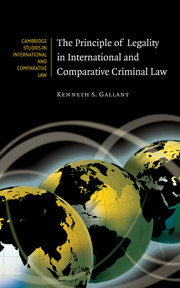Book contents
- Frontmatter
- Contents
- Explanatory Note on Spelling
- Acknowledgments
- Introduction
- 1 Legality in Criminal Law, Its Purposes, and Its Competitors
- 2 A Partial History to World War II
- 3 Nuremberg, Tokyo, and Other Postwar Cases
- 4 Modern Development of International Human Rights Law: Practice Involving Multilateral Treaties and the Universal Declaration of Human Rights
- 5 Modern Comparative Law Development: National Provisions Concerning Legality
- 6 Legality in the Modern International and Internationalized Criminal Courts and in the UN Trust Territories
- 7 Legality in Customary International Law Today
- Conclusion: The Endurance of Legality in National and International Criminal Law
- Appendix A Chart of Non-retroactivity Provisions in Criminal Law by Nations
- Appendix B Legality and Non-retroactivity Provisions as of 1946–47
- Appendix C Constitutional and Other National Provisions Implementing the Principle of Legality Today
- Bibliography
- Table of Authorities
- Index
- Afterword and Update
- CAMBRIDGE STUDIES IN INTERNATIONAL AND COMPARATIVE LAW
- References
7 - Legality in Customary International Law Today
Published online by Cambridge University Press: 04 July 2009
- Frontmatter
- Contents
- Explanatory Note on Spelling
- Acknowledgments
- Introduction
- 1 Legality in Criminal Law, Its Purposes, and Its Competitors
- 2 A Partial History to World War II
- 3 Nuremberg, Tokyo, and Other Postwar Cases
- 4 Modern Development of International Human Rights Law: Practice Involving Multilateral Treaties and the Universal Declaration of Human Rights
- 5 Modern Comparative Law Development: National Provisions Concerning Legality
- 6 Legality in the Modern International and Internationalized Criminal Courts and in the UN Trust Territories
- 7 Legality in Customary International Law Today
- Conclusion: The Endurance of Legality in National and International Criminal Law
- Appendix A Chart of Non-retroactivity Provisions in Criminal Law by Nations
- Appendix B Legality and Non-retroactivity Provisions as of 1946–47
- Appendix C Constitutional and Other National Provisions Implementing the Principle of Legality Today
- Bibliography
- Table of Authorities
- Index
- Afterword and Update
- CAMBRIDGE STUDIES IN INTERNATIONAL AND COMPARATIVE LAW
- References
Summary
THE CORE RULES OF LEGALITY IN CUSTOMARY INTERNATIONAL LAW
The history since World War II, set out in previous chapters, shows that the law has changed since Nuremberg. The central aspects of the principle of legality in criminal law, especially the non-retroactivity of crimes and punishments, are now rules of customary international law.
The statement of the principle of non-retroactivity of crimes and punishments from the Universal Declaration of Human Rights (UDHR) has become customary international law:
No one shall be held guilty of any penal offense on account of any act or omission which did not constitute a penal offense, under national or international law, at the time when it was committed. Nor shall a heavier penalty be imposed than the one that was applicable at the time the penal offense was committed.
The prohibition of the act and the maximum penalty must not only have been in existence at the time of the act. They must also have been applicable to the actor and the action at the time. An act cannot constitute an offense carrying a penalty except pursuant to some national or international law applicable to the actor and the act at the time committed.
This summary of the customary international human rights rules of legality is based on the practice and opinio juris of states, the organic documents, other documents, practice and opinio juris of international organizations (especially but not only international criminal courts and tribunals), writings of publicists, and other evidence.
- Type
- Chapter
- Information
- Publisher: Cambridge University PressPrint publication year: 2008

